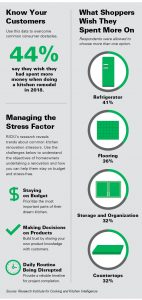As the chief of insights for the Research Institute for Cooking and Kitchen Intelligence (RICKI), Erin Gallagher says understanding the path to purchase for customers undertaking kitchen renovations is critical. Discover the data RICKI has compiled to help streamline kitchen renovations hurdles and boost your transaction size.
High Performance Retailing (HPR): Can you tell our readers about RICKI’s mission and some of the research it does?
Erin Gallagher (EG): RICKI has conducted more than 100 studies on home kitchens since 2006. The Remodelers 360 study gauges homeowners’ sentiments about the kitchen remodeling experience. We also track the regret factor, which asks people whether they would spend more, less or the same amount if they had a do-over. It’s striking that close to half would spend more money if they were doing the same project today. That’s a sign retailers are leaving money on the table.
HPR: From your research, how can home improvement retailers capture more sales from customers undertaking a kitchen remodel?
EG: I think home improvement retailers should market ways to overcome the regret factor to their customers. Whether you have someone sitting on the fence about splurging on a few items or debating whether to increase a room’s footprint, close to half of all customers will regret not going for what they really wanted when they first had the chance.
 HPR: What does RICKI’s research reveal about how customers are getting inspiration for their kitchen remodels?
HPR: What does RICKI’s research reveal about how customers are getting inspiration for their kitchen remodels?
EG: We ask respondents where they got ideas for their kitchen projects, and the No. 1 response for three survey periods running is “big-box retail stores.” Followed by that come magazines and TV as sources of inspiration. But drawing inspiration from TV can be problematic.
A lot of homeowners and the design professionals we interviewed about the regret factor mentioned “the magic pixie dust” of networks like HGTV. Homeowners feel frustrated that renovation TV shows fail them by not revealing accurate pricing on products and labor as well as showing unrealistic timelines. Homeowners believe their remodels will be done a lot faster than what is feasible. This discrepancy negatively impacts the retailers they buy from and the design pros they hire.
I think it’s important to help customers manage their expectations but still get the kitchen they want. Ask customers what their dream kitchen looks like. It may take a bit more time, but the regret factor reflects the importance of the kitchen in the minds of consumers. It’s the heart of the home.
HPR: How can independent retailers help reduce the regret factor?
EG: One of the questions we asked homeowners recently was what stressed them out the most
during the kitchen renovation process. Staying on budget and making decisions were two of the biggest concerns, so anything a retailer can do to help streamline decision-making and suggest ways to stay on budget is helpful. They need to uncover ways to reduce stress from homeowners.
 Erin Gallagher studies the ways homeowners draw inspiration for their renovation projects, pain points they encounter during renovations and how satisfied they are with their project once it’s completed. Discover more of RICKI’s insights into kitchen construction and renovation by visiting them online at kitchenintelligence.org.
Erin Gallagher studies the ways homeowners draw inspiration for their renovation projects, pain points they encounter during renovations and how satisfied they are with their project once it’s completed. Discover more of RICKI’s insights into kitchen construction and renovation by visiting them online at kitchenintelligence.org.
 Hardware Retailing The Industry's Source for Insights and Information
Hardware Retailing The Industry's Source for Insights and Information








